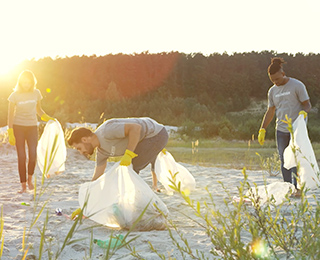
Through its various activities, LabelVie Group impacts the environment through the millions of customers who visit its stores every day. Each of the internal entities is therefore voluntarily working to limit its ecological footprint in order to contribute to a better preservation of natural resources. LabelVie Group is committed to :
A firm has been mandated to apply the principles of Hygiene Health & Environment at the worksite level, and an EMS manager has been appointed.
A program started in 2016 which has enabled the application of good energy saving practices, the monitoring of the construction of thermal insulators and the purchase of non-energy-intensive equipment.
Reducing energy consumption is an essential element of the environmental concerns of any CSR policy. As such, LabelVie Group promotes natural lighting by means of glass facades and lumidomes, which represent a new lever for savings integrated into the design of logistics sites.
In addition, since 2017, LabelVie Group has undertaken an initiative which consists of covering the structures of its stores with a photovoltaic roof, thus making it possible to benefit from energy self-sufficiency. Moreover, the Atacadao brand in Meknes was a first successful experience which will be reproduced in future stores in Taza and Marrakech.
Finally, to avoid leaks from refrigerant systems and reduce their impact on global warming, LabelVie Group is planning several DNI system installations (Intelligent Refrigerant Level Detector) which would make it possible to analyze the installations from the measurements made and to carry out tightness checks.
LabelVie Group plans to gradually install several waste sorting and management devices, in particular the installation of grease separators in its stores and logistics platforms, but also to sign partnerships with its suppliers for the collection and the recycling of plastics and paper.
An anti-food waste policy has been adopted by LabelVie Group. It consists of a partnership with a specialized service provider who undertakes to recover and recycle bakery products to make animal feed.
In addition, a Supply Chain business project has been designed to help define processes and best practices to optimize product transit flows, but also to automate orders to avoid overstocks and to control quantities and finally monitor product rotations in stores.
The level of specific flow complexity at LabelVie Group is very high because it involves more than a hundred stores throughout the Kingdom, an almost daily delivery frequency and above all several types of flow with temperature either ambient, or negative or even positive directed.
Faced with these challenges, LabelVie Group has adopted a proactive policy in terms of sustainable development for transport. The objective is to reduce CO2 emissions. A program has been implemented with a view to agile management of the planning and optimization of delivery rounds allowing the increase in the filling rate of trucks, by a process of massification of multi-temperature flows, by the implementation of short circuits for fruit and vegetables thanks to regional sourcing and finally by optimizing upstream and downstream transport with the reduction of empty returns.
To reduce noise pollution, LabelVie Group has opted to cover its generators or compressors and to install anti-noise equipment when possible, otherwise hiding it behind insulating walls.
Finally, local and organic agriculture is greatly encouraged. Long-term partnerships are built with small producers from different regions of Morocco.
